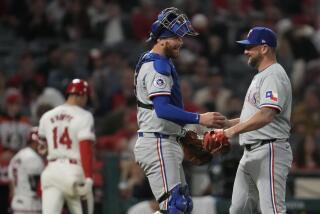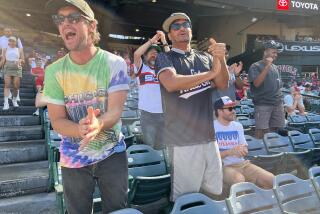Mauch and Angels Go From Heaven to Boston : Pennant Kept on Ice by Loss in 11th, 7-6
- Share via
The Angels touched the World Series Sunday at Anaheim Stadium. They saw it, they smelled it, they heard it, they tasted it.
Then they got the second out of the ninth inning.
After that, nothing made sense.
How did the 5-2 lead that Mike Witt took into the top of the ninth inning turn into a 7-6 Boston victory by the end of the 11th?
Why did Manager Gene Mauch, who had maneuvered the Angels to within one out of their first American League pennant, suddenly start making all the wrong moves?
How could Gary Lucas, the man brought on by Mauch to record that final out, put the tying run on base by hitting Rich Gedman on the hands with his first and only pitch?
What happened to Donnie Moore, staff stopper, who grooved a 2-and-2 pitch so fat that slumping Dave Henderson (.189 since Aug. 19) jerked it over the left-field fence for a two-run home run and a 6-5 Red Sox lead?
Why did Doug DeCinces, the Angels’ best clutch hitter since the All-Star break, swing at the first pitch he saw from reliever Steve Crawford with one out in the bottom of the ninth--popping to right field and leaving the bases loaded with the score tied at 6-6?
How could Moore, presented an 10th-inning reprieve, fall apart again in the top half of the 11th--allowing the first three Red Sox to reach base and the first, Don Baylor, to score the winning run on a sacrifice fly by, yep, that man Henderson?
How? What? Why? Questions that the Angels may mull over and over for a long, long time.
On the verge of finally cleansing the ghosts and shattered spirits of 25 seasons past, the Angels instead were again buried by them. On the verge of coasting into the World Series in five games, the Angels are now flying coast to coast for Game 6 of the American League championship series, scheduled for Tuesday night in Boston. The Angels lead the best-of-seven series, 3-2.
This Angel victory seemed so certain, and the Red Sox seemed so dead, that in the ninth inning, several California Highway Patrol officers entered the Boston bullpen to offer the Red Sox instructions on how to get back to their lockers without encountering the pandemonium among the 64,223 fans that seemed certain to spill onto the field.
And the Red Sox were paying attention.
“Of course I was listening,” Joe Sambito said. “I wanted to get out of there safely.”
Instead, all Angel pennant celebrations were put on hold--maybe permanently, unless the Angels can rebound for a split in Boston. Kirk McCaskill will face Boston’s Dennis (Oil Can) Boyd in Game 6. If a seventh game is necessary, it will be the Angels’ John Candelaria against Roger Clemens.
When is the last time Clemens failed to win in three consecutive starts? When is the last time winning one of two games in hostile, quirky Fenway Park was ever considered a simple assignment for a visiting team?
“We may have awakened New England,” said Angel infielder Bobby Grich, who had given the Angels a 3-2 lead in the sixth inning on a two-run homer that actually bounced out of center fielder Henderson’s glove and over the fence when Henderson’s wrist hit the top of the wall. “We’re walking into a lion’s den, no doubt about it. It’ll be tough.”
How the Angels got from there to here is one for the franchise’s annals: “Grating Moments in Angel History.”
Witt, who outpitched Clemens so decisively in Game 1, stepped to the mound in the ninth inning needing three outs to preserve a three-run lead. He had been stung early by a two-run home run by Rich Gedman in the second inning but had settled down to pitch six straight scoreless innings.
Then Bill Buckner led off the ninth with a single, and Dave Stapleton came in to run for Buckner. Witt came back to strike out Jim Rice for the first out.
Then, part of the Angels’ past caught up with them. Baylor, the Angel captain on the 1979 and ’82 division winners, now wears red socks, and he knocked the halo out of a full-count pitch, depositing it over the left-center-field fence for a two-run home run. The Angel lead had been sliced to one run at 5-4.
Witt got the second out of the inning, an infield pop-up by Dwight Evans, but was not allowed to get the third. Mauch interceded, calling on Lucas to pitch to Gedman.
Mauch’s reputation for over-managing and mishandling pitchers has followed him for more than two decades--he’ll never be allowed to forget Philadelphia, ‘64--and his moves Sunday provided only more fodder for the critics. Lucas made one pitch and hit Gedman with it, putting the tying run on base. Moore came on needing to get one out--but allowed Henderson to hit it out.
Why start tinkering when your best starting pitcher is one out away from icing the Red Sox once and for all?
Mauch had reasons.
He cited track records. Witt had not got Gedman out in three previous at-bats, surrendering a home run, a double and a single. Lucas, a left-hander, had struck out the left-handed Gedman in the seventh inning Saturday night and also had struck him out in a key situation during the regular season.
“I’ve never seen Gedman do anything other than strike out against Gary Lucas,” Mauch said. “And if he does get something off Lucas, I don’t think it’s going to be anything very big. And I still got my man out there.”
Mauch’s man is Moore, a right-handed reliever who saved 51 games for Mauch over the last two seasons. This time, Moore gave up something very big.
It came on a change-up, a split-fingered fastball thrown at less than full speed. It was delivered with the use of a bothersome right shoulder that was again hurting Moore.
When split-finger meets sore shoulder, the result, for Moore, is usually ugly. Instead of “diving off the table,” as Moore described it, the ball rises in the strike zone.
“No, it did dive,” Moore said, correcting himself. “It dove right over the fence.”
Moore admitted the arm was hurting him.
“Every time I throw, my arm hurts,” he said. “Right now, my arm is about 85 or 90%. But that’s not why I lost the game. I was (horsebleep).”
Moore finally got Ed Romero to fly out for the third out, bringing on the bottom of the ninth for the Angels.
And the Angels, who rallied dramatically the night before to tie against Clemens, did it again, this time against Bob Stanley, who had come on in relief of starter Bruce Hurst in the seventh.
Bob Boone, who had homered and singled in two previous at-bats, made it 3 for 3 by leading off with a single. It was a good day at the plate for catchers.
Ruppert Jones ran for Boone and was sacrificed to second by Gary Pettis. Sambito replaced Stanley to face Rob Wilfong, who immediately lined a single to right field. Jones headed for home.
Right field is where Dwight Evans roams for the Red Sox, and he still can crank up an outfield relay with the best of them. Evans’ throw to the plate was strong and true, but a splendid slide by Jones got him home safely. Jones dived headfirst, toward the south side of the plate, and reached around Gedman’s lunge to slap the back of the plate with his hand.
Crawford replaced Sambito and encountered similar results. The first man he faced, Dick Schofield, also singled, putting runners on first and third. Boston Manager John McNamara then called for an intentional walk to Brian Downing, loading the bases for DeCinces.
DeCinces, who had already doubled twice, once in front of Grich’s unusual homer in the sixth inning, went for it all right away. He swung at Crawford’s first pitch and lofted it to shallow right field. The Angels, not wanting to test Evans again, held Wilfong at third.
Grich followed with a soft liner to Crawford, and the bases were left loaded. Extra innings, for the second straight day, became reality.
Mauch had trouble coming to grips with it.
“I got no place to sleep tonight,” Mauch said. “I bet my house that DeCinces would get that run in from third.”
Moore treaded disaster in the 10th, putting runners on first and third with one out before escaping on a double-play grounder by Rice. Crawford did the same in the bottom of the inning, walking Jerry Narron with two outs and surrendering a blast by Pettis that backed Rice, the left fielder, all the way to the wall.
From the dugout, Reggie Jackson watched the ball carry. “I thought, I hoped, I prayed,” he said.
It wasn’t enough. Rice, with his back pressed against the green vinyl covering, reached up and brought down the ball, having to check his glove to make sure the ball was there, and with it brought along the 11th inning.
In the top of the 11th, Moore ventured where no double play and no last-gasp rally could save him. He hit Baylor with a pitch. He yielded a single to Evans. He threw wide to Wilfong covering first as Gedman to beat out a bunt for his fourth hit.
Then Henderson took him deep again--not over the fence but far enough into center field for a sacrifice fly that scored Baylor.
The final hitter Moore faced, Romero, was only retired by a running, face-splattering catch by Downing, who crashed into the wall to keep the score at 7-6. That gave the Angels at least some hope of another comeback.
But Calvin Schiraldi, the rookie who let Game 4 slip away, doused those hopes. Schiraldi opposed three hitters, and all went down meekly.
Wilfong and Schofield struck out swinging. Downing got his bat on the ball, but only enough to pop it foul to first baseman Stapleton.
An exhausting, incredible, emotion-draining and mind-bending game had finally drawn to a close. The Angels can only take solace in the fact they took part in it.
Grich was playing first base when Baylor joined him after being hit by a pitch in the 11th inning. The former Baltimore and California teammates shook their heads and smiled.
Grich said: “What do you think, Groove?”
Baylor said: “The best game I’ve ever been in.”
Grich said: “You and me both, pardner.”
For the Angels, it was only the best game they ever lost.
More to Read
Go beyond the scoreboard
Get the latest on L.A.'s teams in the daily Sports Report newsletter.
You may occasionally receive promotional content from the Los Angeles Times.






